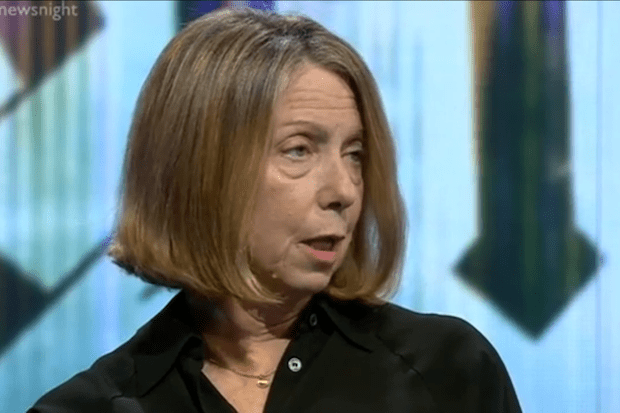Alan Rusbridger, the editor of the Guardian, has been busy tweeting comments from Jill Abramson, the new executive editor of the New York Times, basically in support of his newspaper’s Snowden disclosures. For some reason, he does not seem as interested in her comments about press freedom given on Newsnight last night. Perhaps this is became New York Times has given the reaction that the Guardian should have: that any involvement of politicians in the regulation of the press is appalling and should be rejected. As Abramson put i:-
‘I think that the press in Britain has more restrictions on it than we do. The framers of our country, in the US, had a big fear of too much power put in the central government. As a bulwark against any excesses on the part of the government they believed passionately in the need for a free press. That is a stronger tradition than it is here.’
Paxman asked her ‘So I take it if you were editing your paper in this country you certainly wouldn’t be signing up to the proposed charter?’. Her answer:-
‘Probably not.’
The ‘probably’ is being polite: the New York Times editorial gave a ‘hell, no’. For the reasons she outlined: what the government is proposing would violate the First Amendment and crosses a fiercely-defended line of liberty. I suspect the vast majority of Guardian staff agree with her. Say what you like about the Guardian (and we do) but it does have a longstanding commitment to liberty and one shared by its writers. But not, in the case of press freedom, by its editor. Rusbridger has been far more equivocal about the state licensing of the press, accepting the government’s argument that it’s just a dab of statute and somehow doesn’t count as statutory regulation. It’s baffling: when politicians propose ending our three centuries of press freedom it does not require very long to consider a response.
But times are hard, newspapers are in a fight to the death and there is a strong temptation to go along with state licensing of newspapers if you think the new regime will hurt your rivals worse than it will hurt you. It is no coincidence that the three newspapers least hostile to the government’s proposals: the FT, the Guardian and the Independent- are the three who are unlikely to have a newspaper by the end if the decade if current trends are extrapolated:-
I think the Guardian was wrong to publish the Snowden revelations and give hints to terrorists about the capabilities (and limitations) of our intelligence agencies. But a large part of me admires the Guardian for defying authority: it ought to be a radical newspaper, uncowed by government menaces. I’ve read it all my adult life, and think it’s one of the strongest newspaper brands in Europe. (And for the record, I believe that Alan Rusbridger has been a great editor – albeit one whose success has been rewarded in a digital field that the company is queasy about monetising). I’d hate to see a newsstand without it The Guardian, yet we may do in five years’ time, the way things are going.
The New York Times is publishing the simple, powerful and principled editorials that would – in another era – have appeared in the Guardian as a matter of course. The Times is in its own war with Rupert Murdoch (whose Wall St Journal is now a major competitor) and by hyping up the hacking scandal is a way to try and inflict serious harm on its own biggest enemy. But the Times has not let this commercial interests or feuds cloud its view on press freedom. It’s not clear that the same can be said for the management of the Guardian.
It’s a shame that the media wars now underway – what can be seen as death throes for some British newspapers – has muffled the Guardian’s voice just when we needed to hear it most.








Comments